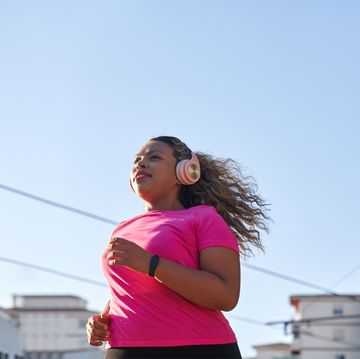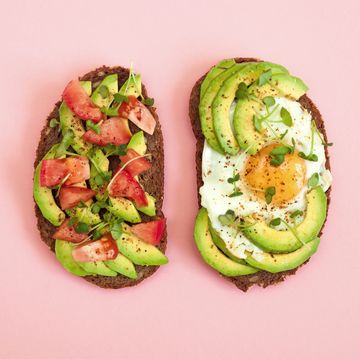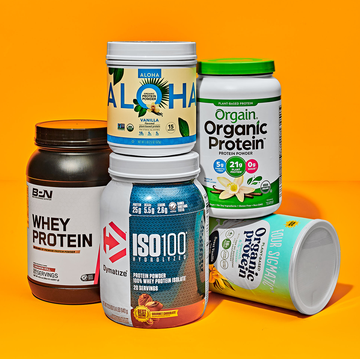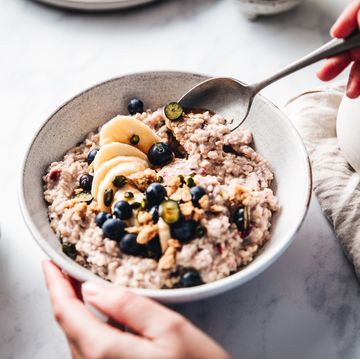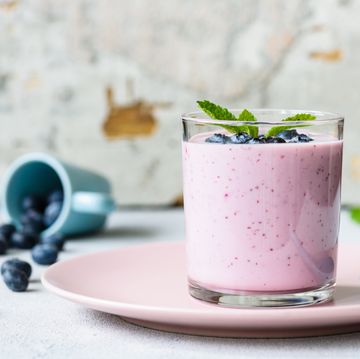If you're on the keto diet, you've probably never paid more attention to the macronutrients you consume each day. What you may not know, though, is that the low-carb, high-fat, and moderate protein diet has been around for nearly a century.
"The ketogenic diet was developed by a Mayo Clinic physician, Dr. Wilder, in the 1920s to treat children with severe epilepsy," explains Tara Schmidt, MEd, LD, lead registered dietitian for the New Mayo Clinic Diet. "While still used in seizure control, the keto diet has also become increasingly popular in the weight loss space."
You can learn a lot more about the keto diet here, but the TL;DR is that the goal is for the body to use fat instead of carbohydrates for energy, and to form ketones (organic compounds your body uses in place of carbs).
"Although there are a variety of versions of the diet, they are all low in carbohydrates; most often less than 50 grams per day," explains Schmidt. "Clinically, a percent of total calories or a ratio of fat to protein and carbohydrates is used, as calorie needs (each gram of carbohydrate has four calories) are dependent on age, sex, height, and weight."
Meet the experts:
Tara Schmidt, MEd, LD, is the lead registered dietitian for the New Mayo Clinic Diet.
Bonnie Taub-Dix, RDN, is the creator of BetterThanDieting.com and author of Read It Before You Eat It: Taking You from Label to Table.
The keto diet consists of around 75 percent fat, moderate protein at around 20 percent and a severely restrictive carbohydrate intake weighing in at around 5 to 10 percent, says Bonnie Taub-Dix, RDN, creator of BetterThanDieting.com and author of Read It Before You Eat It : Taking You from Label to Table. This pretty much means consuming no more than 20 to 50 grams of carbs per day. "Just to put that in perspective, a small fruit provides around 15 grams of carbohydrates, and a cup of cooked pasta around 30 grams," says Taub-Dix.
FYI: Sugar is a type of carb, but "keto followers strictly slash carb content, without necessarily distinguishing between natural sugars (from fruit) and added sugar (from the sugar bowl)," says Taub-Dix. "They even cut out healthy, valuable carbs, like beans, that don’t contribute added sugar but do contribute a wealth of nutrients."
Can you eat fruit on the keto diet at all?
This tends to be a hot topic on the keto diet since some types aren't deemed keto-friendly. "The reason why some fruits are permitted, and others are not, is purely on the basis of their carbohydrate content," says Taub-Dix. "It has nothing to do with their nutritional value."
But completely eliminating fruit may come with negative nutrition and health side effects since it can be a good source of fiber and potassium, and also benefits overall gut health.
"Most Americans don’t get enough fiber or potassium [in] their diets as it is," adds Taub-Dix. "Potassium can support heart health and fiber is essential to support gut health while also stabilizing blood sugar levels."
And with summer just around the corner, you may be curious if its star fruit, watermelon, is keto-friendly. So can you eat watermelon on keto? We asked dietitians for the 411.
Can you eat watermelon on keto?
To determine if any fruit (or food for that matter) is "allowed" on the keto diet, consider how many carbs are in a reasonable serving. One cup of diced watermelon will provide 11.5 grams of total carbohydrates. So, yes, you can probably eat watermelon on keto, so long as you keep track of how many carbs you're consuming from it, and how those carbs factor into your total carb intake for the day.
That's good news since "watermelon’s high-water concentration can play a positive role in hydration, especially in these warmer months," says Schmidt. "It is also a rich source of the antioxidants lycopene and beta-carotene." (Lycopene has been linked to reducing risks of heart disease and certain types of cancer.)
FYI: Some proponents of keto will tell you to track "net carbs" (essentially total carbohydrates minus dietary fiber) but that term isn't used by the Food and Drug Administration or recognized by American Diabetes Association. "The term 'net carbs' is a made up marketing term that has no formal regulatory definition," explains Taub-Dix.
What other fruits can you eat on keto?
"In order to get more of fruit, dieters could select those which have lower carbs, though portion [size] is key," says Schmidt.
Here are a few fruits that typically can fit into a keto diet:
- ½ cup watermelon (~6 grams of carbs)
- ½ cup blackberries (~7 grams of carbs)
- 1/2 cup raspberries (~7 grams of carbs)
- 2 apricots (~8 grams of carbs)
What fruits should you avoid on keto?
Certain fruits are harder to fit into the keto diet based on their higher carb content. These include:
- 1 medium banana (27 grams of carbs)
- ½ cup grapes (~14 grams of carbs)
- ½ cup mango (~12 grams of carbs)
- ½ cup pineapple (~11 grams of carbs)
And you should also be mindful of dried or dehydrated fruit. "Pulling out the water means increased concentration of calories and carbs," adds Schmidt. "A half cup of grapes is 14 grams of carbohydrates, which is the equivalent of only two tablespoons of raisins."
Emily Shiffer has worked as a writer for over 10 years, covering everything from health and wellness to entertainment and celebrities. She previously was on staff at SUCCESS, Men's Health, and Prevention magazines. Her freelance writing has been featured in Women's Health, Runner's World, PEOPLE, and more. Emily is a graduate of Northwestern University, where she majored in magazine journalism at the Medill School of Journalism and minored in musicology. Currently residing in Charleston, South Carolina, Emily enjoys instructing barre, surfing, and long walks on the beach with her miniature Dachshund, Gertrude.




